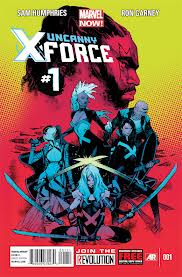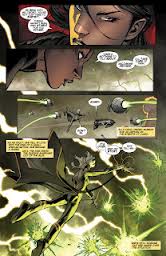Comics /
Comic Reviews /
Marvel Comics
Uncanny X-Force #1 Marvel NOW! Review
By Dan Horn
January 25, 2013 - 12:35
At the risk of sounding like a parrot (I think everyone who has had
anything to say about the new
Uncanny X-Force #1 has touched on this),
Sam Humphries is in an unenviable position. Rick Remender's
Uncanny
X-Force series which ran from 2010 to 2012 will most likely be
remembered by fans as one of the most revered comic book runs of the
twenty-first century. Remender had a relative nonentity to reshape when
joining the X-Force creative ranks, and his collaborators, from the
brilliant color artist Dean White to prodigious pencillers and inkers
like Jerome Opena and Phil Noto (not to mention the head-turning,
identity-establishing covers of Esad Ribic), gave this new X-Force a
scintillating potential, and ultimately an unstoppable momentum. Over
the course of two years, that nonentity was elevated by those creators
and was established as a must-read book, which now puts Humphries at
something of a disadvantage.
Readers are still soaking in the greatness that was Remender's
Uncanny
X-Force. It isn't that his run was perfect; far from it. The Otherworld
arc exhibits one of the series' gravest thematic missteps, a tonally
aberrant slog through a nigh-pointless "epic." But Remender always
managed to save face. Even when things seemed to drag on a bit to long,
or plot devices became baldly apparent, readers were always drawn back
into the thick of things, back into the savage fray, whether by virtue
of Remender's intriguing characterizations, breakneck pacing, sharp wit,
and flare for bombastic histrionics or the series' overall pristine
visuals.
The predecessor series' success highlights an integral component to its
éclat: perfection in serialized comic book storytelling wasn't
necessarily translated from the creators' unwavering clarity of vision
or from the unfaltering quality of the work; in the end, it came from
sum of the book's parts and from its ambitions, whether or not they were
all ultimately fulfilled. So, then, it isn't perfection that Humphries
should be aiming for, but a unique voice; an ambitious approach to the
newest superstars of Marvel's lineup. But, sadly, ambition is not what
Humphries displays in this first issue of the latest incarnation of
Uncanny X-Force.
UXF #1 occurs six months after the finale of Remender's saga and tells
of Psylocke's unsuccessful attempt to transition back into a banal
existence at the Xavier Institute after her turn at the helm of X-Force.
Although the mutant black-ops cell had been previously disbanded after
years of hellish missions had taken their psychological toll on the
team, Logan (Wolverine), now the headmaster of the Institute, still has a
need for covert operatives to address supernatural, underworld threats.
Considering Psylocke's failure to readapt, Logan assigns her to a new
mission in Los Angeles. Reluctantly, she accompanies the newly divorced
Storm to a seedy club where drugs are being used to create an army of
brainwashed devotees. A mystery lies in to whom or what are they
devoted, but that point is overlooked by Psylocke when an old foe
resurfaces at the club.
There's a disappointing reality on display here. While Humphries didn't
need to be Remender to make
Uncanny X-Force work quite so swimmingly, he
needed to bring something else to the table, and needed to bring it right
from the word "go." (Another interesting feature of Remender's UXF was
that he seemed to realize the importance of establishing the book's
violent themes within the very first pages and pepper in character
incites after the reader's attention had been forcibly taken hostage,
and his UXF #1 certainly opened with that necessary bang; Humphries'
opening salvo lacks any similar visceral punch). The main plot here
feels too familiar to be interesting, like it's been pulled from a hat
of comic book cliches. Psylocke's characterization is strange: She's
brash, thuggish and dimwitted, and most of all very angry. Humphries attempts to
address her change in status quo with an "you've changed" moment, but
that feels like an excuse to paint her as an archetypal
mala mujer. Weirdly sparse
and voiceless captions narrate actions and introductions like
afterthoughts. Other disparate plot lines crop up here and there, but
don't have serviceable transitions or any real purpose besides reminding readers that eventually
there will be more members in the team. To his credit, the final page of
the issue did raise an eyebrow, but while Humphries' X-Force is a
wholly different animal from Remender's, I can't help but make direct
comparisons between the two: I am severely missing that Remender wit;
I'm missing the resonance of character depth; I'm missing the strong,
interpersonal relationships; I'm craving the persistent motifs, abundant in Remender's run.
Much like Humphries' storytelling, Ron Garney's art has a lamentably
superficial sheen. Where the Olivier Coipel and Laura Martin cover left
me with a hankering for grit and dynamism, a page-turn reveals a glossy glamor reel. Garney's art is sumptuous, and as a longtime follower of
the artist it is remarkable to note the arc of his stylistic evolution
from his work on Captain America in the 90's to this particular issue
now, but for a book stamped with a parental advisory and concerned with a
mutant kill-squad, Garney's pencils, Danny Miki's inks, and Marte
Gracia and Israel Gonzalez's colors feel more Saturday-morning-cartoon
than ultra-violent-exploitation.
The failure of the artistic team to establish a discernible, let alone appropriate, timbre for
the new series in conjunction with Humphries' lackluster showing and a
high price point consummate a sour aftertaste that bodes ill for
Uncanny
X-Force. The book is not only doomed to live in its predecessor's shadow, but it gladly succumbs to the mediocrity destined for it in that penumbra.
Rating: 6 /10
Last Updated: January 17, 2025 - 08:20

